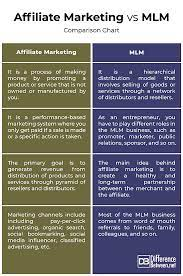
As more and more businesses move towards digital marketing, it’s essential to understand the different marketing channels and strategies available. Two popular options are affiliate marketing and multilevel marketing (MLM). While they share some similarities, there are key differences that you need to be aware of before deciding which network marketing strategy is best for your brand.
Affiliate Marketing
Affiliate marketing is a performance-based affiliate marketing industry where a business rewards affiliates for driving traffic and sales to their website. This widespread network marketing model allows businesses promoting brands to expand their reach and drive revenue without heavy advertising.
Affiliates can be anyone with an online presence, from bloggers, network marketers, and social media influencers, to social media marketers and network marketing companies. They promote the brand’s products or services to their audience, earning a commission for each sale through their unique affiliate link.
Affiliate marketing is a low-risk strategy for businesses as they only pay affiliates when they make a sale. It’s also a cost-effective way to expand your brand’s reach, as you only pay for results.
Multilevel Marketing
Multilevel marketing (MLM) is a performance-based marketing strategy that operates differently from the affiliate marketing business. In an MLM, independent contractors (distributors) sell a company’s products or services directly to customers and recruit other distributors to do the same.
Distributors earn a commission on their sales and the sales made by the distributors they recruit. This creates a “downline” network recruitment of distributors who earn commissions on their sales and the sales made by those they’ve recruited.
MLM companies often have complex commission structures and require distributors and affiliate marketers to purchase products or starter kits to start making money online. This can make it a risky and costly strategy for individuals looking to make money online.
MLMs have been controversial, with some accusing them of being pyramid schemes. While MLMs are legal if they operate within specific guidelines, it’s essential to research and understands the risks before getting involved.
Which is Best for Your Business?
When deciding between affiliate marketing and other MLM programs, it’s crucial to consider your own small business” goals and resources. Affiliate marketing is ideal for companies looking to expand their reach and drive sales without investing heavily in advertising. It’s also a low-risk strategy, as you only pay for results.
MLM can be a high-risk, high-reward strategy for individuals looking to make money. However, it’s important to do your due diligence and ensure that the MLM company you’re considering operates within legal guidelines and is reputable.

Affiliate Marketing Programs
Affiliate marketing programs are typically easy to join and offer a low barrier to entry for new affiliates. Most programs provide their affiliates with marketing materials such as banners, links, and email templates to make it easy for them to promote the products or services. Affiliates can promote the products in various ways, such as creating blog posts, social media posts, or email campaigns.
One of the advantages of affiliate marketing is that it can provide a steady stream of passive income for affiliates. Once they have established their affiliate network and marketing strategies, they can earn commissions on sales through their affiliate links without additional effort. Additionally, affiliate and referral links to other marketing channels can be a cost-effective way for businesses to increase their sales as they only pay commissions on actual sales.
Multilevel Marketing Companies
Multilevel marketing companies are structured in a way that allows distributors to earn commissions not only on their direct sales but also on the sales made by the distributors they recruit. This can make it an attractive option for individuals looking to build a team and earn passive income.
However, MLMs have come under scrutiny due to affiliate businesses’ pyramid-like structure and compensation plans. In a pyramid scheme, individuals make the vast majority of money primarily by recruiting new members rather than selling products or services. Pyramid schemes are illegal in many countries, including the United States.
It’s important to note that not all MLMs are pyramid schemes, and many legitimate MLMs operate within legal guidelines. However, it’s essential to thoroughly research any MLM company before joining to ensure that it is reputable and operates within the law.
Affiliate marketing and multilevel marketing are two popular performance-based marketing strategies. However, both have unique benefits and risks, and it’s essential to carefully consider which method is best for your business before deciding to implement it.
Suppose you want to implement an affiliate program or multilevel marketing for your business or website. In that case, it’s recommended that you consult with an experienced digital marketing professional to ensure you follow best practices and legal guidelines.

Affiliate Marketing vs. Multilevel Marketing: Which is Better for Your Business?
When choosing between affiliate marketing and multilevel marketing models, you must consider several factors, including your business goals, budget, and resources.
Affiliate marketing is typically the best option for businesses wanting to increase their sales and brand exposure without investing significant time and resources into recruiting and managing a sales team. It’s also an excellent option for businesses with a limited budget, as most affiliate programs and marketing programs usually offer a cost-effective way to promote products and services.
On the other hand, multilevel marketing is an attractive option for businesses that want to build a sales team and earn passive income. It can also be an effective way to increase brand exposure and customer engagement, as distributors often become advocates for the parent company and its products.
However, it’s important to note that MLMs have come under scrutiny due to the potential for abuse, and many legitimate MLMs have faced legal challenges. Therefore, businesses considering multilevel marketing should thoroughly research the company and its compensation plan before deciding.
Tips for Successful Performance-Based Marketing
No matter which performance-based marketing strategy you choose, there are several tips you can follow to increase your chances of success:
Choose the right program: Research different programs and choose one that aligns with your business goals and values.
Provide quality products or services: To ensure that your affiliates, sales representatives, or distributors are successful, provide them with high-quality products or services they can confidently promote.
Communicate clearly: Establish guidelines for your affiliates or distributors and provide them with the necessary resources to succeed in their sales job.
Offer competitive compensation: To attract and retain top-performing affiliates or distributors, offer competitive compensation and incentives.
Track and measure performance: Use analytics tools to track and measure the performance of your affiliates or distributors and make adjustments as needed.
In conclusion, affiliate and multilevel marketing can be effective performance-based multi-level marketing and strategies. First, however, it’s essential to carefully consider the advantages and disadvantages of each and choose a top multi-level marketing program that aligns with your business goals and values. Then, by following best practices and providing quality products or services, you can build a successful performance-based multilevel marketing program that drives sales and increases brand exposure.

How to Determine the Right Performance-Based Marketing Strategy for Your Business
Choosing the right performance-based marketing strategy for your business can be challenging, especially if you’re unfamiliar with the differences between affiliate marketing competition online and multilevel marketing. Here are some steps you can take to help you determine the right referral marketing strategy for your business:
Define your goals: Define your business goals and what you hope to achieve with your performance-based marketing strategy. For example, are you looking to increase sales, build brand awareness, generate revenue, or both?
Consider your budget: Determine how much initial investment you’re willing to invest in your performance-based affiliate marketing program and strategy. Affiliate marketing programs typically have lower upfront costs than multilevel marketing, but you must offer competitive compensation to attract top-performing affiliates.
Evaluate your resources: Consider your available resources to manage and support your performance-based marketing program. For example, do you have the time to make money and the expertise to recruit and manage a sales team, or would it be more efficient to do affiliate marketing vs. partner with affiliates?
Research your affiliate program options: Research different affiliate and multilevel marketing programs and evaluate their compensation plans, startup costs, track records, and reputations. Look for programs that align with your business goals and values.
Test and refine: Once you’ve selected a performance-based marketing strategy, test and refine your approach over time. Use analytics tools to track and measure performance and make adjustments as needed.
Final Thoughts
Performance-based marketing can be a powerful way to drive sales and increase brand awareness, but choosing the right strategy for your business is essential. By defining your goals, considering your budget and resources, researching your options, and testing and refining your approach, you can build a successful performance-based marketing program that helps you achieve your business objectives.

Multilevel Marketing: An In-Depth Look at this Business Model
At its core, Multilevel Marketing (MLM) is a business model where companies rely on a network of independent distributors to sell their products or services. These distributors sell products and recruit new distributors into the network, creating a hierarchical structure of multiple levels. MLM has been debated for years, with some people seeing it as a legitimate business opportunity while others view it as a pyramid scheme. This article will look in-depth at MLM, including its history, structure, pros and cons, and legality.
A Brief History of MLM
MLM’s roots in the direct marketing and selling industry date back to the late 1800s. In the early days, direct selling companies relied on door-to-door salespeople to sell their products. In the 1950s, the MLM business model was born when companies like Nutrilite and Amway started using a network of distributors to sell their products. MLM gained popularity in the 1980s and 1990s, with companies like Avon, Mary Kay, and Herbalife becoming household names.
How MLM Works
In an MLM network or business, distributors earn money by selling products directly to consumers and recruiting new distributors into the network. When a distributor recruits someone new, they become part of the distributor’s downline. As a result, the distributor earns a commission on the sales made by their downline and a percentage of the commission earned by the distributors in their downline. This creates a hierarchical structure, with the top-level distributors making the most money.
Pros and Cons of MLM
Proponents of MLM argue that it offers a low-cost business opportunity with the potential for high earnings. MLM companies often provide training and support for their distributors, making it easier for them to succeed. In addition, distributors can work from home and set their schedules, making it a flexible option for people looking for a side hustle or a full-time business opportunity.
Critics of MLM argue that it’s a pyramid scheme where only the top-level distributors make significant money. They also say that the business model is unsustainable, as it relies on constantly recruiting new distributors into the network. In addition, many MLM companies have been accused of making false or misleading claims about their products and earnings to potential customers, leading to lawsuits and regulatory action.
Legality of MLM
MLM is legal in most countries if it meets specific requirements. In the United States, MLM is regulated by the Federal Trade Commission (FTC). The FTC has guidelines for MLM and affiliate marketing companies to follow, requiring them to sell products to consumers rather than just to their distributors. MLM affiliate marketers and software companies must also disclose certain information to potential distributors, such as the average earnings of distributors at different levels of the network.
Conclusion
In conclusion, MLM is a business model that has been around for decades and is still popular today. While some people have succeeded with an MLM program, others have lost money. As with any business opportunity, it’s essential to research and understands the pros and cons before getting involved. If you’re considering joining an MLM company, know the compensation plan, the products, and the requirements for success. MLM programs can be a legitimate business opportunity, but it’s not for everyone. Conclusion
In conclusion, affiliate and multilevel marketing are popular performance-based marketing strategies. While they share some similarities, they operate differently and have unique benefits and risks. When deciding which method is best for your business, carefully considering your goals and resources is essential.
Thank you for reading our article. We hope that you found it informative and valuable. If you have any questions or want to learn more about affiliate or multilevel marketing, please don’t hesitate to contact us.
CoopBusiness is a revolutionary cooperative business-building platform that empowers individuals to become entrepreneurs, business owners, and financially independent.
As a member, you’ll receive top-level business mentorship, access to our proprietary business systems, and the opportunity to access the funds you want to turn your business ideas into reality.